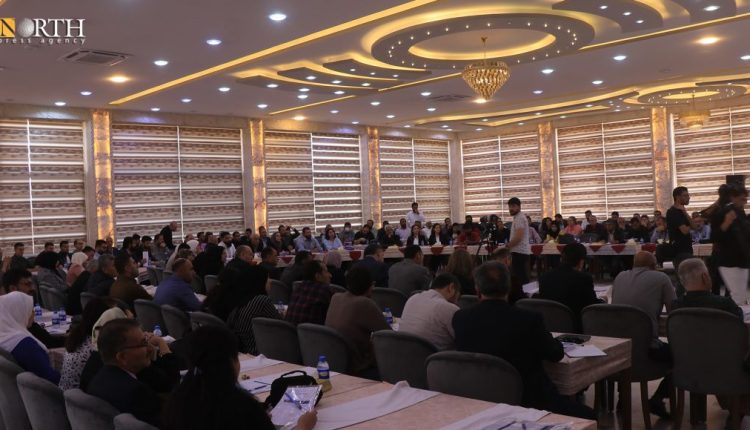
By Avin Youssef
QAMISHLI, Syria (North Press) – The Coalition of Civil Society Organizations in North and East Syria (CSO-NES) held a forum on Saturday in the city of Qamishli, northeast Syria, to improve the education system in the region.
The forum was part of a series of meetings that were held during April. The meetings presented research on agricultural, healthcare, and educational sectors in areas run by the Autonomous Administration of North and East Syria (AANES).
The research was presented by Ahmad Abu Shakir, an education expert, who explained the methodology of the research and presented the challenges facing the educational process, in addition to the final results and recommendations.
Faisal Khudr, co-chair of the Education Board in Hasakah Governorate, northeast Syria, told North Press that the forum comes at a time when the Education Board has identified the difficulties facing the education sector and ways to solve them.
Based on the outcomes and recommendations of the forum, a future plan will be drawn up to improve the education process, pedagogy, teachers, students, school infrastructure, and curricula, in order to keep pace with the development of the educational process, Khudr added.
Education deteriorates in Syria
Farid Saadoun, an academic participant, indicates that the researcher presented a comprehensive study of the education process in Northeast Syria, which reflects its reality, including students, teachers, or administrators in the Education Board.
Saadoun told North Press that these challenges concern Syria in general, not just the AANES-run schools, and the problem has worsened further after the Syrian crisis.
Saadoun further pointed out that if the forum’s recommendations are taken into consideration by the relevant officials in the educational sector within the AANES, the challenges will be resolved and the educational process will improve.
Saadoun added that improving the educational process requires financial, scientific, and academic resources, as well as buildings, along with a set of factors that will lead to overcoming and solving the problems.
Three key sectors
Nasser Hajj Mansour, a coordinator in CSO-NES, emphasized that the three forums were carefully chosen because the highlighted sectors are the most important for community.
Mansour told North Press he believes there is a shortage in the areas discussed in the three forums, and enhancing them is a vital necessity to establish a prosperous, secure, and developed society.
He highlighted the “complex” challenges faced by the CSO-NES in implementing the project, especially in the education sector.
He emphasized that these forums aim to address problems on deeper and broader level and in a way that enables relevant parties to intervene and enhance in the future.
There are over 860,000 students in about 4,200 schools that teach AANES’s curriculum, which is always under continuous improvement and not recognized by the Syrian government.
Mansour also stressed that improving the sectors of agriculture, healthcare, and education requires significant financial resources, and international efforts to achieve the desired outcomes.
